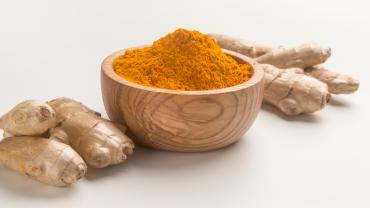
Curcumin is a polyphenolic compound derived from turmeric (Curcuma longa), and it is used both medicinally and as a spice. It is well-known to help support antioxidative status. Research indicates that it may help modulate superoxide dismutase, glutathione levels, malondialdehyde (MDA), and other markers related to oxidative stress. Recent research has explored the potential of curcumin to help support the body’s response to oxidative changes due to exercise.
Curcumin and its derivative curcuminoids have been shown to support the activation of the Nrf2 pathway and its signaling gene, NQO1, in laboratory studies. Through the activation of Nrf2, curcumin has been shown to help decrease certain pro-inflammatory cytokines, such as interleukin-6 and tumor necrosis factor-alpha, and to help inhibit abnormal levels of serum MDA. It may also help increase the concentration of glutathione in liver mitochondria and help increase the expression of phase II detoxifying genes.
A recently published randomized controlled trial by Bańkowski and colleagues explored the potential role of curcumin in markers related to aerobic capacity and antioxidative status. The study involved 30 middle-aged amateur long-distance runners. The treatment group involved 2 g curcumin daily for 6 weeks. Maximal oxygen uptake (VO2max) was assessed at baseline and at the study terminus while performing an incremental exercise test. Blood samples were taken at rest, immediately after exercise, and 60 minutes post-exercise. The biomarkers assessed include superoxide dismutase, glutathione, glutathione peroxidase, MDA, and others related to antioxidative status. Sirtuin 3 (SIRT3) levels, 8-hydroxy-2’-deoxyguanosine (8-OHdG), and muscle damage markers, such as creatine kinase, lactate dehydrogenase, and myoglobin were also assessed. SIRT3 helps to maintain mitochondrial homeostasis under conditions related to stress.
Significant improvements in SIRT3 levels were observed in the treatment group after the trial period completion. The serum concentrations of 8-OHdG, a marker related to DNA damage, were significantly lower in the treatment group after study completion. Creatine kinase activity was also lower in the treatment group after the 6-week time period. Nonsignificant increases in VO2max were observed in both groups at the trial terminus when compared to baseline. Drawbacks to this study include population homogeneity, a relatively small sample size, and a relatively short trial period.
Research indicates that curcumin may support a healthy response to inflammation. It may also help support antioxidative status. Although more research is needed, particularly in a clinical setting, the study by Bańkowski and colleagues indicates that curcumin may support certain parameters related to high-intensity exercise and a healthy response to oxidative stress.
By Colleen Ambrose, ND, MAT